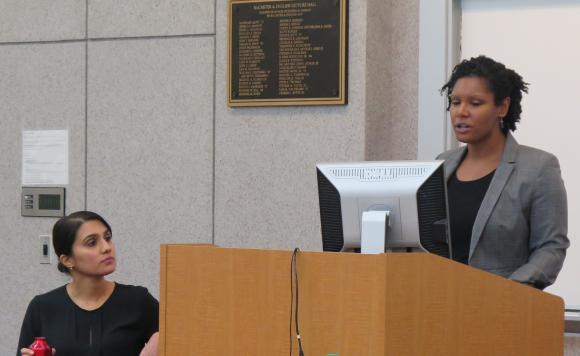
Visiting Assistant Clinical Professor of Law Jeena Shah of the International Human Rights Clinic, left, and Assistant Professor of Law Alexis Karteron, Director of the Constitutional Rights Clinic, right, discuss the executive order about immigration.
As the effects of President Trump’s executive order banning people from seven nations from entering the United States played out in the public eye since Friday, two Rutgers Law professors who specialize in constitutional law and international human rights discussed the order at a teach-in with law students and professors on Tuesday.
An estimated 17,000 students attending school in the United States are impacted by this order, and while it is unknown at this time how many were prevented from reentering the U.S. over the last few days, at least one Rutgers student from Syria was barred from boarding a plane to return to the US on Saturday. In addition, the order is affecting business people, families who were visiting relatives or on vacation, non-permanent workers, athletes, and entertainers.
The order resulted in mass demonstrations at airports around the United States and court cases challenging its legality. On Saturday, a U.S. District Judge in Brooklyn granted an emergency stay, effective nationwide, forbidding removal of affected persons from the United States. The petitioners in that case, Darweesh v. Trump, are Iraqi nationals who face persecution in Iraq because of their prior service to the US government. They are represented by the ACLU, the International Refugee Assistance Project, National Immigration Law Center, and a law firm.
Cautioning that the legal status of the executive orders is changing rapidly, Assistant Professor of Law Alexis Karteron, Director of the Constitutional Rights Clinic, and Visiting Assistant Clinical Professor of Law Jeena Shah of the International Human Rights Clinic, talked about the order and the reactions to it taking place around the nation.
The order temporarily bans entry to persons from seven Muslim-majority nations: Iran, Iraq, Libya, Somalia, Sudan, Syria and Yemen.
It also suspends all refugees from coming into the U.S. for the next four months and bans Syrian refugees from coming to the United States indefinitely.
Initially, the order also affected permanent legal residents of the United States (green card holders), so that if they were outside of the U.S., they would be prohibited from re-entering. However, the Department of Homeland Security has since said it will allow permanent residents to reenter the U.S. if there are not other reasons to keep them out.
In addition, the President cut by more than half the number of refugees to be allowed in the U.S. this year.
Professor Shah said the ban has impacted people who have spent years and thousands of dollars going through the legal process to obtain visas to come to the United States and the ban has separated families. She said stories are coming in from airports around the United States such as elderly people who were detained for hours and a mother who was separated from her young child who had been granted permission to join her in the United States.
Professor Karteron also talked about the large response of attorneys flocking to airports to aid detainees, including bringing laptops to write out habeas corpus petitions and printing out legal documents on mobile printers. There are also reports of some detainees not being allowed to see lawyers and Karteron said it is not clear how many people detained at airports over the weekend may have been deported.
The professors also said a number of lawsuits challenging the order have been filed this week, including class action suits out of Seattle, Washington and Alexandria, Virginia. The Virginia case, Sarsour v. Trump, brought by Muslim community leaders from around the United States, alleges that the executive order violates the First and Fifth Amendments to the U.S. Constitution because its targets Muslims on the basis of their religion and infringes on the right of Muslims to practice their religion.
That case also includes claims under the Administrative Procedure Act. The Washington case, Abdiaziz v. Trump, is brought by American citizens and legal permanent residents from the seven banned countries who have sought visas on behalf of their family members, as well as those visa holders or applicants—a process brought to a halt by the executive order. They claim that the order violates the Constitution and Immigration and Nationality Act by discriminating on the basis of nationality.
Co-dean Ronald K. Chen, who works on constitutional law cases on behalf of the ACLU and the Rutgers Constitutional Rights Clinic, said, “I think it’s pretty safe to say – especially in the (Rutgers Law School) clinics – we’re going to be engaged in this for some time to come.”